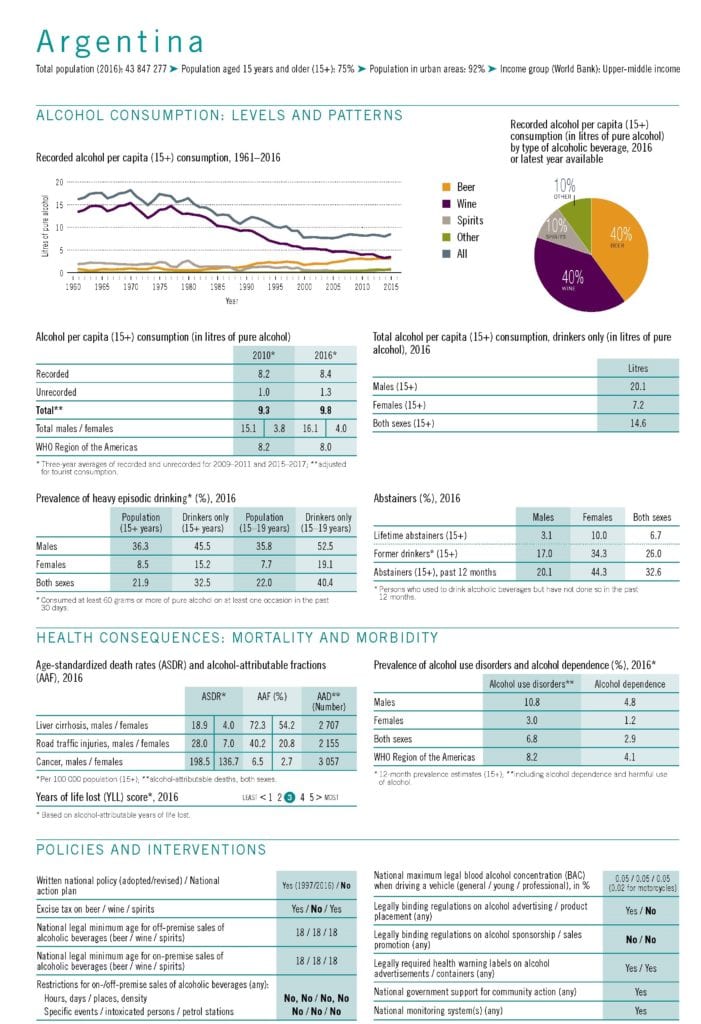The lower house of Argentina’s parliament passed a zero-alcohol-while-driving Bill in late November. There was overwhelming support for the Bill by Argentinian parliamentarians with 195 voting in favor of the bill. Meanwhile, 19 rejected the bill and 4 abstained.
However, the bill needs to pass the Senate to be adopted and enforced. Merco Press reports that the Senate is expected to make some amendments before passing the Bill.
This law, which has to do with the accident rate resulting from [alcohol] consumption, comes to repair, at least a little, the great loss suffered by many families,” said Frente de Todos (FdT) lawmaker Jimena López, the Deputy Chairwoman of the House’s Transport Committee, as per Merco Press.
The norm comes to put a limit to the speculation of [one] or two [units of alcohol]. [All alcohol] consumption has an impact and affects the faculties.”
Frente de Todos (FdT) lawmaker Jimena López, Deputy Chairwoman, House Transport Committee
Télam, the Argentine national news agency, reports that seven provinces and twelve localities in Argentina already have a zero-tolerance policy for alcohol while driving. In these areas, the policy has reduced traffic accidents.
Alcohol policy and harm in Argentina
Currently, Argentina’s laws allow for a 0.05 blood alcohol content (BAC) limit for driving cars and a 0.02 BAC limit for motorcyclists. If the new law is passed by the Senate the BAC limit for driving will become zero.
As the World Health Organization reports, in 2016, the total per capita alcohol consumption was 9.8 liters in Argentina. This is higher than the average for the WHO Americas region. 32.5% of all Argentinians over 15 years of age who consume alcohol report binge alcohol use.
The harm caused by the products and practices of the alcohol industry in Argentina is clear. In 2016,
- 10.8% of men and 3.8% of women reported an alcohol use disorder.
- Alcohol caused,
- 2155 deaths due to road traffic injuries,
- 2707 deaths due to liver cirrhosis, and
- 3057 deaths due to cancer.
The Argentinian government can better protect its people by implementing evidence-based, high-impact policy solutions, such as the measures recommended by the World Health Organization in the SAFER alcohol policy blue print, especially the alcohol policy best buys.
The three alcohol policy best buys are:
- Limiting the availability of alcohol products.
- Reducing the affordability of alcohol products through pricing measures, such as public health oriented alcohol taxation.
- Banning alcohol advertising, sponsorship, and promotion.
Additionally, the WHO provides a manual to help policymakers reduce driving under the influence of alcohol (DUI) accidents and deaths. However, this WHO manual does not address the alcohol industry’s role in fueling DUI crashes and deaths.
Alcohol industry policy interference in Latin American countries
The alcohol industry attempts to interfere with alcohol policy making in Latin American countries, including Argentina, to ensure alcohol industry-favorable policies. Big Alcohol does this to water down alcohol policies, increase sales, and maximize private profits.
According to a report from 2020, in Latin America and the Caribbean, Big Alcohol employs a host of strategies and tactics taken out of the playbook of the tobacco industry, such as:
- Information campaigns to achieve strategic objectives,
- Constituency building and forming strategic alliances,
- Image advertising,
- Lobbying,
- Substituting ineffective for effective policies,
- Using financial measures to influence favorable policies, and
- Legal action and litigation.
This array of strategies is deployed to ensure alcohol industry-favorable policies in four key areas:
- Alcohol availability,
- Alcohol affordability,
- Alcohol marketing, and
- Countermeasures to prevent driving under the influence of alcohol.
The report titled “The Alcohol Industries Commercial and Political Activities in Latin America and the Caribbean: Implications for Public Health” is based on a systematic review of alcohol industry activities since 2015 in Latin America and the Caribbean (LAC) which was researched and written by Katherine Robaina, Tom Babor, Ilana Pinksy and Paula Johns.

